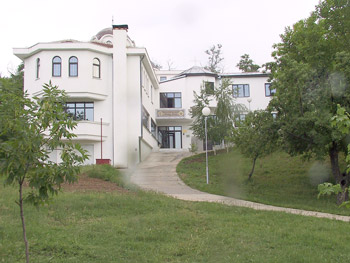On September 26, 1967, the Holy Synod of the Macedonian Orthodox Church decided to establish an Orthodox Seminary, a theological centre for higher education that would produce educators for the needs of the Church. The curriculum of this school was designed at the first council of the teachers, held on October 17, 1967, with the blessing of H.E. Methodius, Metropolitan of Kičevo and Debar at that time. At first, the school was situated in St. Elijah's upper monastery in the village of Banjani, in the Skopje region, and regular classes began on November 1, 1967, with 68 students in all five years. The collegiate body consisted of three full-time and about six associate teachers, and the first rector of the school was the professor Boris Boškovski.
The following year, this school was moved to the village of Dračevo. With Invocation of the Holy Spirit, the school year began on December 4, 1968. Due to its poor condition, the school building was renovated in 197 3.
3.
In the school year 2001-2002, classes were held in the quarters of the stavropegic monastery of the Nativity of the Most Holy Mother of God, in the village of Kališta, Struga. At the same time the renovation was carried out of the complex of the Seminary in Dračevo, which grew into a modern type institution. A new chapel was built as well, dedicated to the school patron – Saint Clement of Ohrid.
The education here lasts for five years and it is a boarding school. The ordinary day begins at 5:45 A.M. with the Morning Prayer and breakfast. Then, regular classes begin, followed by lunch and extra activities. After this, follows the Evening Prayer, two activities to study, supper, watching TV, and one more activity. The day ends with the Common Prayer before going to bed and preparation for the night rest at 10 P.M.
The extra activities include: theological platform, choir, ecology or literature clubs, sports, humanitarian or Red Cross activities. All clubs are run by teachers. The Seminary has a school library that houses around 6,000 volumes.
It is noteworthy that among the school graduates there are such who later received the title of graduate theologians at our Faculty of Theology or abroad. Among them there are several with a master's or a doctor's degree. We are also pleased by the fact that two metropolitans, Timothy and Stephen, have graduated from this school. As far as monasticism in Macedonia is concerned, the renewal of which is on the way, six of the students from this school have entered the monastic order.